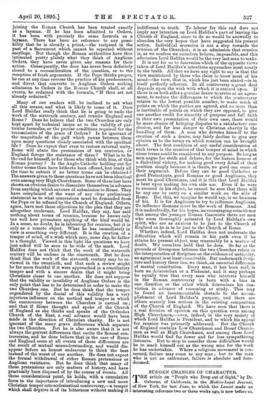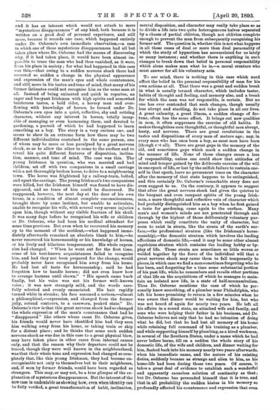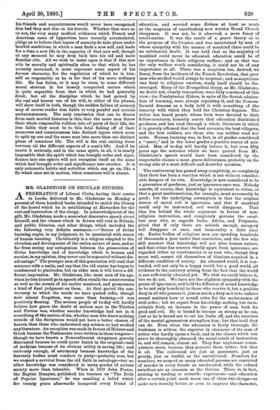SUDDEN CHANGES OF CHARACTER..
THE article on " People who Drop out of Sight," by Dr. Osborne, of California, in the Medico-Legal Journal, of New York, for last June, to which the Lancet made an interesting reference two or three weeks ago, is now before us,
and it has an interest which would not attach to mere " mysterious disappearances " of any kind, both because it is written on a good deal of personal experience, and still more, because it records one case, which happened entirely tinder Dr. Osborne's own immediate obseivation,—a case in which one of these mysterious disappearances had all but taken place where Dr. Osborne had the means of discovering why, if it had taken place, it would have been almost im- possible to trace the man who had thus vanished, as it were, from his place in society ; for what had happened in this case was this,—that owing to a sudden nervous shock there had occurred so sudden a change in the physical appearance and expression of the man's eyes and whole countenance, and still more in his tastes and tone of mind, that many of his former intimates could not recognise him as the same man at all. Instead of being animated and quick in repartee, an eager and buoyant Irishman with high spirits and somewhat boisterous tastes, a bold rider, a horsey man and over- flowing with knowledge of horses, he turned under Dr.
Osborne's own eyes into a quiet, reflective, shy and retiring character, without any interest in horses, totally incap- able of managing or even harnessing them, and devoted to gardening, a pursuit of which he had happened to learn something as a boy. The story is a very curious one, and seems to show in an extreme form how there may be two different individualities contained in the same person, one of whom may be more or less paralysed by a great nervous shock, so as to allow the other to come to the surface and to reveal his quite different features of disposition, inclina- tion, manner, and tone of mind. The case was this. The young Irishman in question, who was married and had
children, set off with two companions in a small carriage with a not thoroughly broken horse, to drive to a neighbouring town. The horse was frightened by a railway-train, bolted, and upset the carriage. The young Irishman's two companions were killed, but the Irishman himself was found to have dis- appeared, and no trace of him could be discovered. He reappeared, however, the next day at the door of his own house, in a condition of almost complete unconsciousness, brought there by some instinct, bat unable to articulate, unable to recognise his wife, with several very severe injuries upon him, though without any visible fracture of his skulL It was many days before he recognised his wife or children or Dr. Osborne, who had been his medical attendant for some time previous. But even when he recovered his memory up to the moment of the accident, —what happened imme- diately afterwards remained an absolute blank to him,—he never recovered his horsemanship or his knowledge of horses, or his lively and hilarious temperament. His whole expres- sion had changed. " -When he went out for the first time, some of his best-known acquaintances failed to recognise him, and had they not been prepared for the change, would probably never have recognised him away from his home. He had lost all taste for horsemanship ; said he had forgotten how to handle horses ; did not even know how to arrange harness until shown." " His speech came back finally, but his voice was not his former well-known voice ; it was now strangely mild, and the words care- fully selected and evenly enunciated. His hair rapidly turned white in streaks; his face assumed a serious,—almost a philosophical,—expression, and changed from the former jolly, rotund contours, to a careworn, peaked state." Dr. Osborne's view is that this great nervous shock had so changed the whole expression of the man's countenance that had he " disappeared " like others whose cases Dr. Osborne gives, his friends would never have identified him had they seen him walking away from his home, or taking train or ship for a distant place; and he thinks that some such sudden nervous shock as was due in this case to a great physical blow, may have taken place in other cases from internal causes only, and that the reason why their departure could not be traced, though they were well known in the neighbourhood, was that their whole tone and expression had changed so com- pletely that, like this young Irishman, they had become un- recognisable not only to themselves but to their neighbours, and, if seen by former friends, would have been regarded as strangers. This may, or may not, be a true glimpse of the ex- planation of mysterious disappearances. Bnt the interest of the new case is undeniable as showing how, even when identity can be fully verified, a great transformation of habit, inclination,
mental disposition, and character may really take place so as to divide a life into two quite heterogeneous halves separated by a chasm of partial oblivion, though not oblivion complete enough to prevent the man from subsequently recognising his former self. The question is, whether this is not what happens in all those cases of dual or more than dual personality of which the study of hypnotism has accumulated for us lately so many instances ; and whether there is anything in such changes to break down that belief in personal responsibility which alone makes man what he is,—a moral creature who must answer for all his voluntary acts.
To our mind, there is nothing in this case which need affect the belief in the personal responsibility of man for his own actions at all. That there was a great and sudden break in what is usually termed character, which includes tastes, habits of thought and feeling, and memory also, and a break for which the man was not responsible, is certain. But no one has ever contended that such changes, though usually less abrupt and startling, do not take place in all our lives. A great calamity, a great illness, a sudden change of for- tune, often has the same effect. It brings out new qualities in men, it often suppresses the exercise of old habits. It makes thoughtless men thoughtful, or thoughtful men abrupt, hasty, and nervous. There are great revolutions in the tastes and dispositions of every man of mature age ; nay, in every man who has once been a boy, as most men have been (though ant all). There are great gaps in the memory of the old, and sometimes gaps which mark a sudden change in the manner of life. None of these changes cause a loss of responsibility, unless one could show that attitudes of mind and temper gained by the deliberate exercise of the will in one epoch of life, or lost by the selfish failure to restrain one- self in that epoch, leave no permanent trace on the character after the memory of that state happens to be extinguished, and this certainly Dr. Osborne's remarkable story does not even suggest to us. On the contrary, it appears to suggest that after the great nervous shock had given the quietus to the buoyant and even rampant spirits of the young Irish- man, a more thoughtful and reflective vein of character which had probably distinguished him as a boy when he first gained a taste for gardening, came again to the surface. Many men's and women's minds are not penetrated through and through by the highest of those deliberately voluntary pur- poses which really constitute the unity of character, but seem to exist in strata, like the strata of the earth's sur- face,—the professional stratum (like the Irishman's horse- manship),—the domestic stratum which involves the leading affections of domestic life,—and it may be some other almost capricious stratum which contains the leading hobby or by- play of life. Those strata are sometimes so little woven or welded together by the force of the individual will that a great nervous shock may cause them to fall temporarily to pieces, in which case we find a man sometimes forgetting who he has been, and forgetting for a time some substantial portion of his past life, while he remembers and recalls other portions of that life on the acquisitions of which he manages to main- tain an isolated new life, in a state of half-somnambulism. Thus Dr. Osborne mentions the case of which he per- sonally knew something, of a plumber near Philadelphia, who left his home promising to return in a few minutes when he was aware that dinner would be waiting for him, but who was not heard of again for nearly two years. He left all his affairs in a sound state, an attached wife and family, and sons who were helping their father in his business, and Dr. Osborne believes not only that he had no intention of doing what he did, but that he had lost all memory of his home while retaining full command of his training as a plumber, and while supporting himself by plumbing, as a hired workman, in several of the Southern States, under a name which he had never before borne, till on a sudden the whole story of his domestic life, of the wife and children, and dinner waiting for him, flashed back into his memory nearly two years afterwards, when his immediate name, and the nature of his existing duties, suddenly became as strange and alien to him, as his home-life had been during those two years. Of course, it takes a great deal of evidence to establish such a wonderful and apparently causeless solution of continuity as that ; but Dr. Osborne has persuaded himself that it is true, and that in all probability the sudden hiatus in his memory so profoundly affected his countenance and expression that even his friends and acquaintances would never have recognised him had they met him on his travels. Whether that were so 'or not, the very many medical evidences which French and American cases of hypnotism have recently accumulated, oblige us to believe that lapses of memory do take place under morbid conditions, in which a man finds a new self, and leads for a time a new life in the capacity of that new self, though at any moment he may drop back into his old and more familiar role. All we wish to insist upon is that if this new role be morally and spiritually alien to that which he has recently sustained, it must represent some aspect of his former character, for the regulation of which he is him- self as responsible as he is for that of his more ordinary life. He has fallen, or it may be risen, to some different moral stratum in his loosely compacted nature which is quite separable from that in which he had generally lived; but all the discipline which he had gained by the real and honest use of his will, in either of his phases, will show itself in both, though the sudden failure of memory may of course render him liable to very painful and serious embarrassments. The only conclusion that can be drawn from such morbid histories is this, that the more men throw their whole responsible volition into all parts of their life, the less liable they must be to this fatal flaking off of their memories and consciousness into distinct layers which seem to split up one and the same man into more than one distinct phase of conscious life. The will is the real uniting force between all the different aspects of a man's life. And if he exerts it seriously, and in the same spirit, in all, it is nearly impossible that the spirit which has brought order and signi- ficance into one sphere will not recognise itself as the same which had brought order and significance into another. It is only automatic habits and activities which can go on, like a fly-wheel once set in motion, when conscious will is absent.




































 Previous page
Previous page